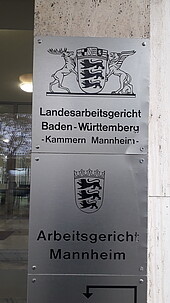At the end of October 2024, our study course led by Prof. Dr. Kohl visited the Mannheim Labor Court and took part in five chamber hearings. The chamber consisted of one professional judge and two honorary judges, each representing the interests of employees and employers. Honorary judges are appointed by their companies and hold office for a period of four years.
In labor court proceedings, a conciliation hearing takes place first. If this does not lead to an agreement, a chamber hearing is scheduled. At the beginning of the chamber hearing, the judges check the presence of the parties or their representatives. Further written applications and information from the parties are taken into account. The judge summarizes the facts of the case and highlights disputed points. The employer and employee have another opportunity to reach an agreement.
Lawyers may, but do not have to, be involved. Employees can appear without legal assistance, but this is often disadvantageous as they are not always sufficiently aware of their rights. Financially disadvantaged employees have the option of applying for legal aid or support from legal expenses insurance.
Evidence, e.g. witness statements or documents, can be introduced during the course of a chamber hearing. The hearing can end with an agreement, an adjournment or a further hearing. At the Degree, the judge and the honorary judges deliberate on the case.
Statement from Daphne Andringa:
"I particularly enjoyed the practical experience of how a chamber hearing works. It also shows me how important it is for both employers and employees to be particularly well informed about their rights and obligations."
Statement from Nina Schick:
"The excursions were very interesting and exciting for me personally. I was very impressed by how the labor court investigates labor law disputes and mediates between the parties. I was particularly struck by the calm and approachable manner of the presiding judge, whose explanations made the complex legal processes understandable and transparent, even for those affected who had language and communication difficulties. It was also impressive how precisely and in a structured manner he summarized the key points for the minutes.
The atmosphere in the courtroom was objective and professional. The presiding judge managed to create a pleasant atmosphere through his understanding manner.
I was particularly surprised that the court always endeavors to end legal disputes through amicable settlements instead of passing judgements. This makes the court an important mediator and arbitrator in the de-escalation of disputes."


